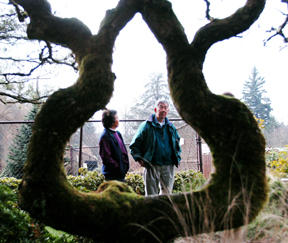Had it not been for his Uncle Sam, Junkoh Harui might have devoted his life to a different kind of green than the plants that surround him at Bainbridge Gardens.
In 1955, Harui was a newly minted University of Washington business graduate who had accepted a job to work with Lou Goller at American Marine Bank.
Instead, he got drafted. And while he was in the service, the situation changed.
“When I got out, there weren’t any jobs,” Harui said. “Mo Nakata said I should start a flower shop, and I decided to give that a try.”
So in 1958, Harui opened Town and Country Florist in a 600-square-foot annex on the eastern edge of the Town & Country market, owned by Mo and John Nakata and Ed Loverich.
Bainbridge Gardens plans a year of celebrations and special events, beginning with a birthday party Saturday that will feature old photographs, ads and articles in addition to the traditional cake.
Town and Country was the island’s first florist, and it opened at the right time – an era of proms, formal dinners and other occasions calling for corsages and cut flowers.
In four years, the florist moved to the Winslow Way storefront now occupied by Esther’s.
“It had five times the space of the original store,” Harui said, which was more of a testament to the constraints of the first location than the expansiveness of the second.
At that point, Harui was only a retail florist, doing none of his own growing.
“We used a wholesale florist in Seattle, and I would be there four or five times a week,” he said.
In 1972, the first big expansion came about when the retail operation and its staff of seven moved to a three-acre site at the southwest corner of High School Road and Highway 305.
That site had enough room for a growing operation, so the name became Town and Country Florist and Nursery.
“I started as a florist and branched into the nursery operation,” Harui said.
The nursery operation overtook flower sales, partly because of the times.
“The 70s were awful for flowers,” said Chris Harui, who met Junkoh while the two were at the UW and married him the same year the floral shop opened.
“Everybody wanted ferns in their house, but no cut flowers, and corsages were definitely out,” she said.
Some of the plant nurturing was still being done at home.
“If they needed a big tree, they would come and dig it out of my lawn,” “When they did that, though, I would tell them that they had to put something back. So they would, but then sometimes they’d dig that up again. When people would come by, they would see a cherry tree in my front yard that kept getting shorter and shorter,” she said.
Then in 1989, Hildebrand Lane was built off of High School Road, and the Village shopping center developed, forcing the existing merchants to relocate.
For the Haruis, that meant going “home” to Miller Road, and to the family property called Bainbridge Gardens.
“My father and uncle owned 20 acres on both sides of Miller Road,” he said. “They had greenhouses and fields, a display garden and a gas station and grocery store that they called Bainbridge Gardens.”
“We are in an amphitheater of trees here, most of which were planted by my uncle and father 90 years ago, which makes this very special to me,” he said.
The Harui family didn’t run the grocery store – they leased it to Mo Nakata and Ed Loverich, who got Junkoh into flower business years later.
During World War II, though, the situation changed drastically. In the face of the 1942 internment order, the Haruis took the other option available to the island’s Japanese-Americans, and moved east of the Cascades, settling on a farm in Moses Lake.
During the war years, the Haruis leased the Miller Road land to a family called Anderson, “who paid enough rent so that we could pay the taxes, and not lose the land,” Harui said.
When the war ended, Nakata and Loverich came back to the store, which they operated until they moved downtown in 1957. But the remainder of the property had deteriorated beyond repair.
“The greenhouse roof had collapsed during the war from the weight of the snow because they couldn’t keep it heated,” Harui said. “It was total devastation.”
Since 1989, the Haruis have restored the original buildings that could be saved, built new buildings and greenhouses, and expanded to a four-acre operation that employs as many as 32 people during peak season including daughter Donna, the only one of the four Harui children active in the business.
Now 70, Junkoh Harui says he hopes to make arrangements that will keep the gardens intact and active. But there won’t be a transition during his lifetime, if he has his wish.
“My ambition is to not retire, because I love what I do,” he said. “I intend to collapse right here in the nursery, and be carried out feet first.”



